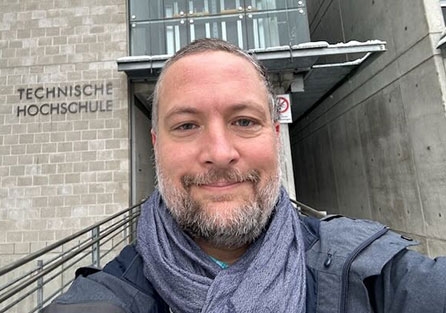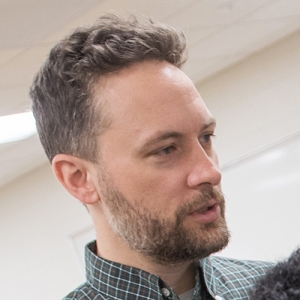John Rieffel, professor of computer science and chair of the department, is spending several weeks over the winter break in a lab in Regensburg, Germany.
Working alongside Professor Valter Böhm, a pioneering design engineer, Rieffel is exploring how to use advanced artificial intelligence techniques to discover new types of tensegrity structures suitable for soft robotics.
Tensegrities are structures made of rigid elements (struts) and tensile elements (springs). The principle of tensegrity is found in engineered systems like umbrellas and camping tents, and in the natural world such as the network of tendons and bones in the human body.
“Soft robots made of tensegrities have potential applications ranging from search-and-rescue to space exploration and even surgery,” said Rieffel.
One of the College’s top experts on robotics, Rieffel is a recipient of the prestigious Mercator Fellowship. Awarded by the German Research Foundation (the equivalent of the National Science Foundation), the fellowship supports long-term project-based collaboration between researchers from German and foreign institutions.
It is awarded to up to six researchers a year who have made meaningful contributions in their field. Rieffel is the first Union professor to receive the honor.
Rieffel and Böhm first met at the IEEE RoboSoft Conference in Livorno, Italy, in 2016. Since then, they have co-organized a series of annual workshops at conferences centered around the theme of soft tensegrity robotics.
Böhm has significant expertise in building novel and sophisticated tensegrity-based robots. Rieffel’s expertise is in algorithms that can automatically design interesting and new types of tensegrities that wouldn't otherwise be able to be designed by a human.
The Mercator project is their first formal collaboration. The research is taking place in Böhm’s lab.
“Our collaboration is about bringing these two skill sets together to design and build exciting new soft tensegrity robots,” said Rieffel. “I’m excited about the possible outcomes.”
The fellowship allows for Rieffel to visit Regensburg multiple times over the next year for two or three weeks at a stretch to conduct research.
The research in Germany will continue back on campus with Rieffel’s students.
“I will be working with our students to design the AI algorithms, run cloud-based experiments and analyze the results, and coordinate with the team on hardware implementation details,” he said.
He is grateful for the opportunity to conduct research in Germany with a prominent peer.
“I feel like the dog who caught the car,” he said. “I considered this application a longshot, and was surprised and deeply honored to be awarded the fellowship.”
Rieffel has degrees in computer science and engineering from Swarthmore College. He received his Ph.D. from Brandeis University. He joined Union in 2009.

